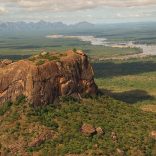Mozambique: Ranger killed by suspected poachers in Gorongosa National Park
Mozambique cracks down on illegal logging

Voa / The timber seized in Nacala was destined to China
In six Mozambican provinces, Operation ‘Tronco’, a government-sponsored monitoring campaign, is searching for illegally logged timber valued at US$300 million. It has not yet been possible to identify those responsible for the timber yards involved, most of whom are of Chinese origin.
Inspectors from the Ministry of Land, Environment and Rural Development have left their desks and are tramping the forests in six central and northern Mozambique provinces searching for the 700,000 cubic meters of wood thought to be on the contraband route.
Since the start of operation, thousands of cubic meters of illegal timber have been confiscated and fines of hundreds of thousands of Meticais imposed.
On Monday 6 June in Montepuez District, Cabo Delgado, where more than 100 timber yards operate, 23,000 cubic meters of illegal timber were seized and fines totaling 50 million Meticais (around US$750,000) imposed.
Amílcar Pereira, coordinator of the operation in Cabo Delgado, said that the lack of documents proving the legality of Madeira is common in shipyards.
“We found a lot of unregistered timber, as well as registered logs where the official in charge was unable to identify the respective documents, which is illegal logging,” Pereira said.
The dominant theme in this operation is that it is not possible to find those responsible for the shipyards, most of whom are of Chinese origin.
“The documentation does exist, but the bosses have fled and the documents are falsified. We even tried to force the locks, but we didn’t succeed,” a shipyard worker in Montepuez said.
As a result, the operation has so far failed to detain any trafficker in illegal timber.
Forestry experts say that the 16/2014 Law, which was revised by the Assembly of the Republic last November and which punishes anybody involved directly or indirectly in the harming of any protected species of fauna and flora with prison sentences, is the reason for the lack of arrests.
Rite Mabunda of the non-governmental organization WWF believes that there should be more research into how to hold the perpetrators accountable.
“In terms of principle the initiative is good, but it needs to be better structured and involve key players and its continuity ensured,” Mabunda said.
Wood seized in this operation reverts the state and is auctioned. Most of those who owned it are now going to export it legally, which Rene Machoco of Environmental Justice argues should not happen.
“It is important that when the wood is put on public auction, those who are directly or indirectly involved in the process are not allowed to compete or participate in the purchase,” she says.












Leave a Reply
Be the First to Comment!
You must be logged in to post a comment.
You must be logged in to post a comment.